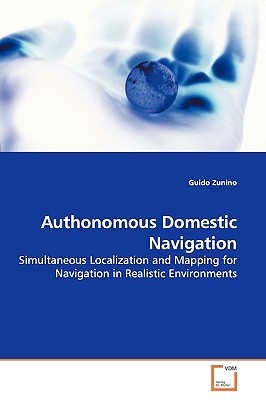
- We will send in 10–14 business days.
- Author: Guido Zunino
- Publisher: VDM Verlag
- Year: 2009
- Pages: 108
- ISBN-10: 3639143892
- ISBN-13: 9783639143898
- Format: 15.2 x 22.9 x 0.7 cm, softcover
- Language: English
- SAVE -10% with code: EXTRA
Reviews
Description
Navigating autonomously in a domestic environment is a problem that has attracted a great deal of interest in mobile robotics. A robotic system that operates in ordinary furnished rooms without the need of an engineered environment has many different applications such as service, cleaning and surveillance tasks or simply entertainment. This book deals with the problem of Simultaneous Localization and Mapping (SLAM). The mobile robot builds a map of an unexplored environment while simultaneously using this map to localize itself. The feature based approach used in this book utilizes the Extended Kalman Filter (EKF) machinery to estimate the pose of the robot and the location of the features. This approach is referred to as stochastic mapping. In addition, this book explores a method for recovering from the most common mode of failure of the stochastic mapping approach. Finally, the book presents a method for achieving more accurate navigation by using the architectural properties of most domestic environments. All the algorithms presented in this book have been tested and verified in real world experiments.
EXTRA 10 % discount with code: EXTRA
The promotion ends in 16d.06:00:24
The discount code is valid when purchasing from 10 €. Discounts do not stack.
- Author: Guido Zunino
- Publisher: VDM Verlag
- Year: 2009
- Pages: 108
- ISBN-10: 3639143892
- ISBN-13: 9783639143898
- Format: 15.2 x 22.9 x 0.7 cm, softcover
- Language: English English
Navigating autonomously in a domestic environment is a problem that has attracted a great deal of interest in mobile robotics. A robotic system that operates in ordinary furnished rooms without the need of an engineered environment has many different applications such as service, cleaning and surveillance tasks or simply entertainment. This book deals with the problem of Simultaneous Localization and Mapping (SLAM). The mobile robot builds a map of an unexplored environment while simultaneously using this map to localize itself. The feature based approach used in this book utilizes the Extended Kalman Filter (EKF) machinery to estimate the pose of the robot and the location of the features. This approach is referred to as stochastic mapping. In addition, this book explores a method for recovering from the most common mode of failure of the stochastic mapping approach. Finally, the book presents a method for achieving more accurate navigation by using the architectural properties of most domestic environments. All the algorithms presented in this book have been tested and verified in real world experiments.


Reviews